As you know SEO plays an important role in organic search and its a permanent and free source of traffic. There are 2 type of SEO: On-Page SEO and Off-Page SEO.
In my previous article, I have already described about the On-Page SEO. If you still not read ny previous article, please read it because search engine rank articles who followed both type of SEO strategies. and in this article we are going to learn about Off-Page SEO.
Let's start with basics and at the end of this article, you will be expert in SEO.
Table of Contents
What is Off-Page SEO?
The optimization done outside your blog post is called Off-Page SEO.
Off-Page SEO is the most important and effective strategy to appear in search engine top results. There are ways you implement this strategy. There can be a legitimate way of doing it as well as an illegitimate way. Illegitimate ways are popularly known as Black Hat Strategies and legitimate ways are called White Hat.
Search Engines do not like shortcuts and illegal ways. However, there are still ways which search engines can not find and tend to rank your article. But major search engines especially Google keep on updating their algorithm. And in case an algorithm update figures out that ways to rank on search results have been optimized through illegitimate ways it will penalize your site heavily. Especially Google dips your rankings, sometimes it even penalizes the entire domain.
There are many world-renowned Bloggers such as Brian Dean, Rand Fishkin, Mathew Woodward, Neil Patel who discuss these techniques in their Blogs. However, all the techniques are not helpful for beginners because either we do not have money, time, a big team, or other resources which the well-established Bloggers have. And generally, budding bloggers try to replicate those techniques as it is and after a lot of hard work when they do not succeed. They get frustrated and shut down their Blog.
In this article, we will discuss all the techniques however we will keep on telling you which are the feasible ones for the Blogs that have just started or Blogs that are struggling to rank their articles.
What is Black Hat Strategies?
Anything done deliberately to manipulate the search engine rankings is Black Hat. Now there is a very thin line between Black Hat and White Hat.
Search Engines love the organic growth of your Blog. In simple words, if you are publishing quality content and marketing it through legal ways, traffic will eventually start coming organically to your Blog and search engines will also start ranking you up.
However, it is not that easy. Especially new Blogs or Blogs with lower domain authority struggle to rank their articles high. Most of the strategies available on the internet, work only when you have higher domain authority. As a result, smaller Blogs or newer blogs are forced to resort to Black Hat Strategies to rank their articles high.
I had published an article on a very high authority website. The article started ranking on the 3rd rank within a month of its publication. The interesting part is that the article has no backlinks and still it ranks high.
If I had published the same content on a lower authority website then results would surely be different.
Hence the underlying problem is that things do not effectively work for the new bloggers. But still, we should never resort to Black Hat strategies.
Let us discuss the best White Hat Strategies
Before we get into the details let us first understand the most used jargon – Backlinks
What is a Backlink?
A link which points back to your blog post from an external post, page, or website is called a backlink. Search Engine treats it as a positive sign and rewards your article for the same. There are many ways you can generate backlinks.
Below is the list of practically doable White Hat Strategies
- Guest Posting – Works for beginners
- Improve and republish old content – for most new Bloggers this does not work since they do not have many posts.
- Search for broken links on high authority website – generally, a very tough and time taking task and is not very feasible for new and smaller blogs
- Spy your competitor for keyword – new Bloggers can do this
- Create youtube videos and do branding on social media – not feasible for beginners
- Use long-tail keyword strategy – must do
- Submit pictures and infographics – partially feasible
- Internal linking – Increase page views
- Brand your Blog
- Engage with your community
- Capitalise on Capability(CoC)
Bonus Suggestion
- Do not waste time on irrelevant things
- Focus on basics
1. Guest Post
Guest Post is one of the best ways to get backlinks. If you read about this strategy in detail on the internet there is one common thing which everyone tells you. Everyone will tell you to reach out to authority websites for contributing the guest post. I also read and followed them and found that it is not that easy.
Why?
Because most authority websites do not give you do-follow links. And the main concern for the blogger who is not yet earning is to rank their articles high as soon as possible. But you won’t rank high if you do not get do-follow links back to your websites.
Then what to do?
Simple, we will have to put a plan in place.
- Aim for less competitive keywords – since we do not have money and other resources to compete against bigger sites and Bloggers we will have to shift our focus to less competitive keywords. Definitely less competitive keywords will have either less traffic or lower CPC but it is still fine. Because if you start ranking on top for a few such keywords by investing lesser money, time and energy then you will start getting traffic with which you can engage to convert them to loyal traffic.
- Put a plan for generating backlinks – nothing comes for free hence you would need to allocate a budget to get the backlinks. Now the budget does not include investment only in terms of money, rather it should also include an investment of time, energy other resources.
How we can plan to get backlinks. Here is a sample plan which you can replicate to generate backlinks.
The backlink profile of your article should have a mix of all kind of links.
I follow 10 links at a time strategy. Here is how 10 links at a time strategy look:-
- 1 no-follow link from a very high authority website through outreach, from where you can get actual traffic. This is mostly free.
- 4 no-follow answers on QnA sites. This way is also completely free.
- 3 do-follow backlinks from a medium authority website. Medium authority websites can be anywhere from 20 DA to 60 DA. Please note since you are a new blogger you might need to invest money to get these backlinks. Search Engines does not like paid links hence you would make these links look natural by using appropriate anchor texts.
- 2 no-follow links from blog comments. This is also free.
Since we have just 3 do-follow out of 10 links. This plan helps us minimise our investment in generating backlinks. You generate these links and wait for the rank of your article to improve. You can keep on repeating the plan until you achieve good ranks.
Another good part of this plan is that it mixes the type of links and helps you avoid getting red-flagged from the search engines.
Learn More: Top 10 Link Building Strategies for 2022 That Work
2. Improve and Republish Old Content
Since new bloggers do not have many posts published this strategy does not work for them. I have seen that all the top bloggers around the world talk about this strategy. The reason is simple, search engines do not like stale, old, and thin content.
Hence if you find any content on your blog which is not relevant anymore you should immediately remove it or recycle it into brand new and relevant content. This will help you in creating a strong authority for your domain. And a strong authority domain gets their article ranked up higher.
3. Check authority websites for Broken Link
This is another very popular strategy to generate backlinks recommended by most Bloggers around the world. But this strategy again does not work for newbies. Because either you won’t get a response from the website or they would not want to link back to your content until it is very exceptional or awesome.
Another reason I do not like this strategy is that it is time-consuming. First, you need to choose the authority website then run it for broken links. Once you identified the broken link on content which matches your niche you would need to send an outreach mail to that website. Chances are very low that you would get a response.
Hence instead of wasting this much time on something which is highly unpredictable I would like to invest my time on something more productive.
4. Spy your competitor for keyword
This technique is very effective. You get to know the potential keywords for which your competitor is already ranking and you can also rank. You can do a link profile check of the URL of the competitor to get the list of domains linking to your competitor’s post.
But the only negative point with this technique is that it is costly. Competitor spy feature is available on many tools such as Semrush, Ahref, Majestic etc. but it is available on paid plans only. Hence the only way you can do this is by using the trial version of these tools but still, you might not get the entire details.
The only other way I can think of is that you can form a team and buy the plans. It will reduce the cost considerably. In fact, Semrush gives you the option to add your team members in the same account. But the only negative aspect of sharing the same plan is that the others would also get to know about the keywords for which you are planning to rank.
How to Spy your Competitor for Keywords?
Suppose our competitor is Wikipedia. Let us spy Wikipedia.
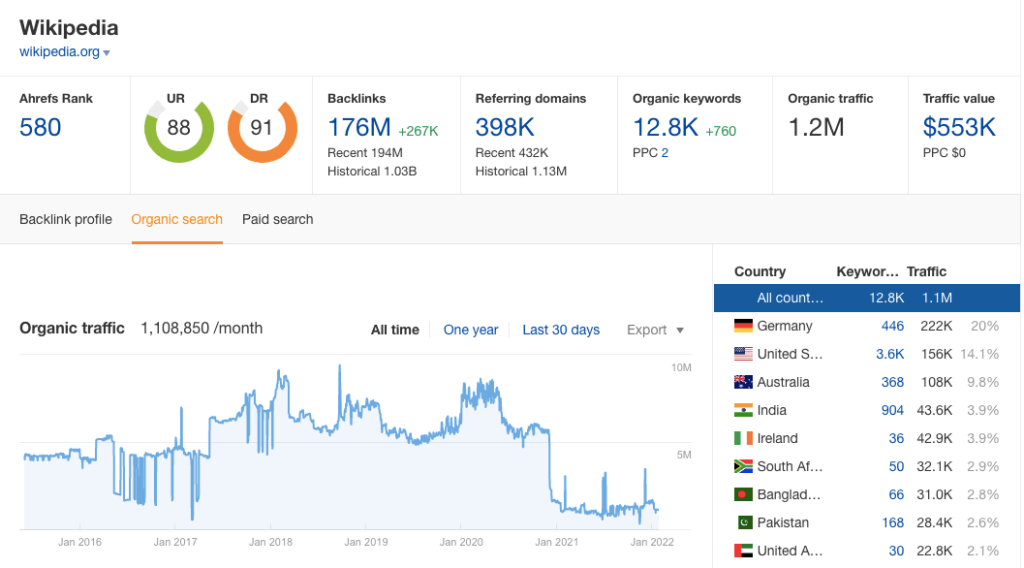
We see that Wikipedia has 43.6K traffic in India. Now we would want to analyze for which keywords Wikipedia ranks and gets it major traffic.
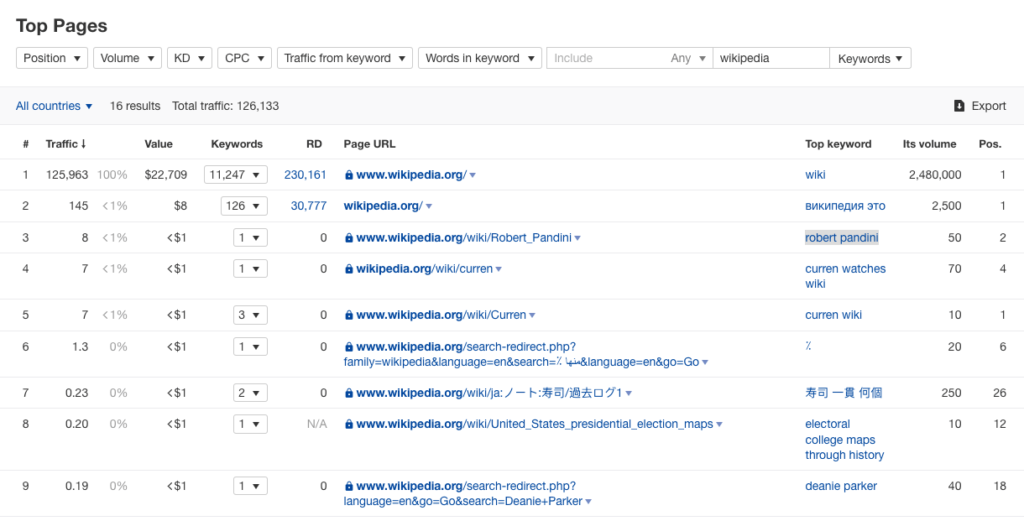
We go to the list of keywords for which Wikipedia ranks. Now we can analyse the traffic, CPC and KD(difficulty level) and decide keywords for which we want to rank. Once we got the keyword then we can get the URL of the post for which this keyword is ranking. The URL column is at the last of the table which is not shown in the above screenshot.
So for keyword ‘robert pandini’, we got the URL –> https://www.wikipedia.org/wiki/Robert_Pandini
Now you need to check backlink to analyse the source of backlink for this article. I use Semrush and Ahrefs, however there are many free Backlink Checker tools which can be used for checking the backlink profile of any blog post or domain.
This analysis give you the keyword, blog post and the list of backlinks generated. Now you can check how on-page SEO is done on the blog post. In short, we have re-engineered the entire blog post and can now put a plan for ourselves to rank on search engine results.
As already discussed tools such as Semrush, Ahref can be very useful for spying on your competitors. But you would need to buy their plans to use this feature. Try using their free version it will help to an extent.
5. Create youtube videos and do branding on social media
Most of the Bloggers start blogging as part-time. Hence they do not have the leisure time and money to do things which established Bloggers can do. And if you notice all the established Bloggers share the strategy which they or their team follow. But if we try to replicate the same strategy we tend to fail. Why?
Because you do not have time and money to create videos on youtube or do branding on social media platforms such as Facebook, Twitter, Instagram etc. It takes a lot of effort to create awesome content and SEO strategies to engage traffic and convert them to subscribers.
By the time we realise that this strategy is not working, we have already invested time, money and energy. Which frustrates us and can sometimes lead to shut the blog.
Hence we must focus on just one way of attracting traffic and engaging with them in the initial years of the Blog.
Do not get distracted and focus only on feasible strategies.
6. Use long-tail keyword strategy
Must do for beginners. Always keep in mind that the keywords which are more attractive i.e have more traffic or good CPC will always have a higher difficulty level for ranking. If you try to rank your article for these kinds of keywords, chances are that you would fail. Because high authority websites and established Bloggers must have already occupied higher ranking and there is nothing left for new websites.
So what you should do?
Aim for keywords where traffic is moderate and competition is less. You can mostly find these features in long-tail keywords.
What is a long-tail keyword?
A long-tail keyword is a phrase with 4 or more keywords. Eg:- ‘best credit card in India’
Let us have a look at whether the long-tail keyword ”best credit card in India’ is good for a new website to plan for.
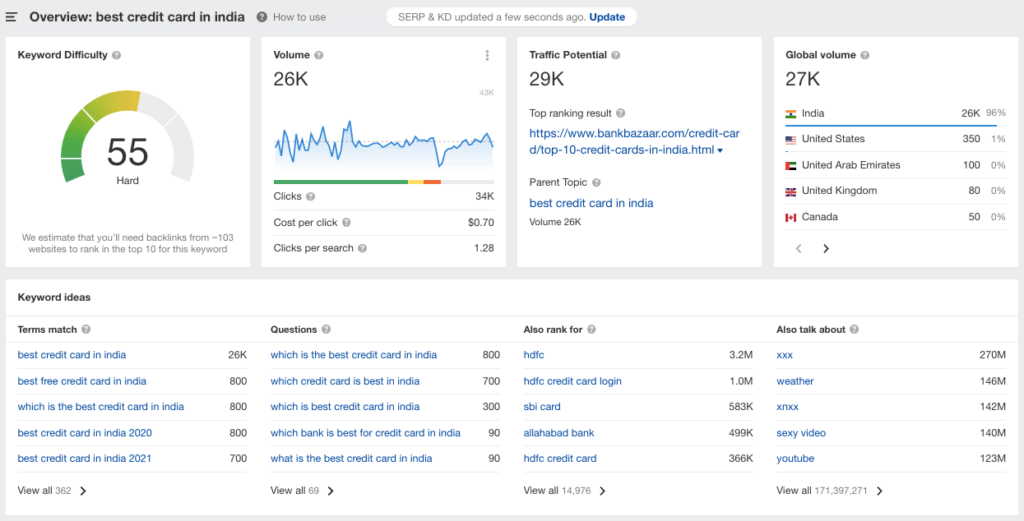
The volume for the keyword is good but the difficulty level is hard. Hence our analysis says that we must avoid competing for this keyword till we do not have very good domain authority.
So what is next?
Let us see some variations of the above keyword with the lesser difficulty level.
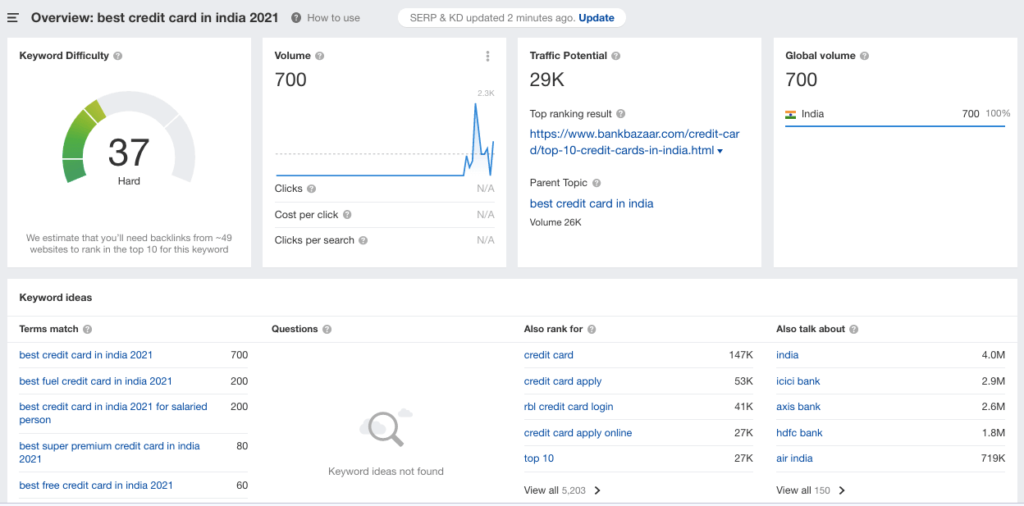
I further went to check the second long-tail keyword in the above list- ‘best credit card in India 2022 for salaried person’. Let us see what we got –
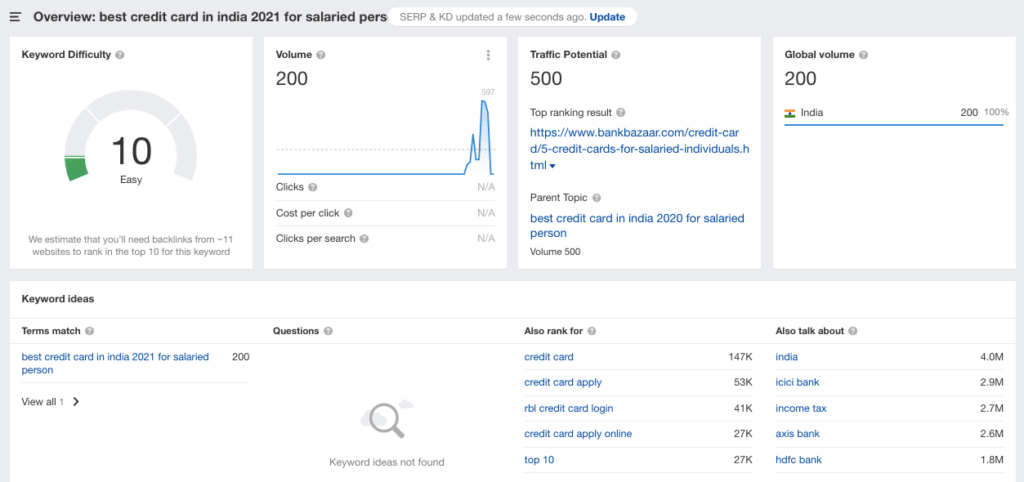
What we find is that the related keyword has lesser traffic and the difficulty level is also less when compared to the previous keyword. Another advantage of a long-tail keyword is that search engine ranks you for the related keywords as well. You can see a list of related keyword/term match in above images.
Hence you have chances of ranking for these as well.
This was just sample research to show how you should go about searching long-tail keywords with lesser difficulty level to rank. I did this using Semrush you can do the same if you have Semrush paid plan or you can do similar research on Goggle Keyword Planner which is a basic tool and must use for beginners.
7. Submit Pictures and Infographics
This strategy can be implemented by new Bloggers. But this strategy is also time-consuming. So if you do not have time then you can very comfortably avoid this technique. Because I recommend Bloggers to do what they can do best. Doing too many things dilutes your efforts.
There are many websites where you can create images and submit. The most popular one is Pinterest. Similarly, you can create awesome infographic and submit on various websites. To search for websites which accept infographics you can search on google as below.
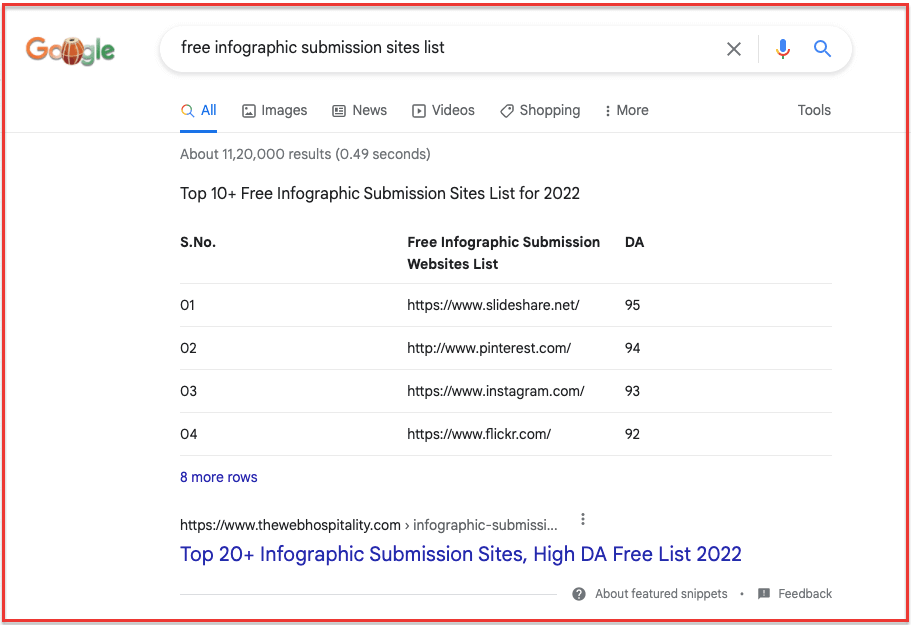
You can also read an amazing post on getting backlinks from Infographics.
8. Internal Linking
Must do. Internal linking is very important for the link juice to flow from your most popular pages to less popular ones. Even Google suggests linking your pages internally. This helps search engines index your pages and understand your site structure.
Internal linking also gives users the best ways to read the most relevant content on your Blog. This way it increases the engagement of your blog with your users.
I follow the pyramid structure. The most relevant content of my Blog sits on the Home Page of my Blog and then I link those article to the second level posts which can add value to the first level and then second level links to the third level posts.
9. Brand your Blog
The newbies should do this to create a brand for their Blog. There are some simple ways to do this.
- Write on very high authority websites even if they do not give you backlinks. In the author bio always remember to mention your brand name. Here is an example of how I did it.
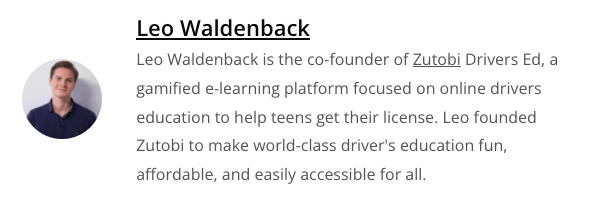
2. Choose a name which stays in people’s minds. Choose something which is unique. For example, you will remember Amazon if you visit the website even once.
3 Choose a logo and choose a good theme which suits your Blog’s niche.
4. Create a community and engage with them frequently. Every member of your community is an ambassador of your Brand.
10. Engage with your community
Well, the new Bloggers do not really have a community. And it takes a lot of time to build one. Hence this is not a very effective way for the new Bloggers. There is a lot of ways you can engage with your community once you have one. You can interact with them through emails at regular intervals. Offer them a course for free or even help in resolving their issues. You can talk to them about your Blog and the future plan you are planning to have for your Blog. Ask them, discuss with them and keep them involved and engaged.
11. Capitalise on Capability
You cannot do a lot of stuff when your website is new and still has a low domain authority. But that should not stop you from growing your Blog and becoming big.
There should be a clear understanding in your head about what you want to achieve.
And you should understand very clearly where your posts can rank and where it cannot. Which means you should understand your Blog’s capability at any given point. You should rank your article only for those keywords where your Blog can fight and defeat the competition.
If you compete for a keyword which is way above your competition level then it is quite definite that your article will never rank high and after a point, you will get frustrated. The solution to this is that rank your blog posts for less competitive keywords and for competitive keywords publish your optimised articles on high authority websites which will automatically rank higher. I call this strategy as Capitalise on Capability.
Bonus Suggestion
So the gist of this post was to make you understand various techniques for Off-Page SEO. It is important that you understand all of them but more important is that you understand which techniques are feasible for you. You should not waste your time and resources on irrelevant things and keep your focus on things which are more effective and feasible for you.
Keep the focus and do not get distracted by the marketing of bigger Bloggers. At Anantvijaysoni.in, we discuss all the techniques but recommend only those which are feasible for the budding Bloggers.
Happy Blogging!



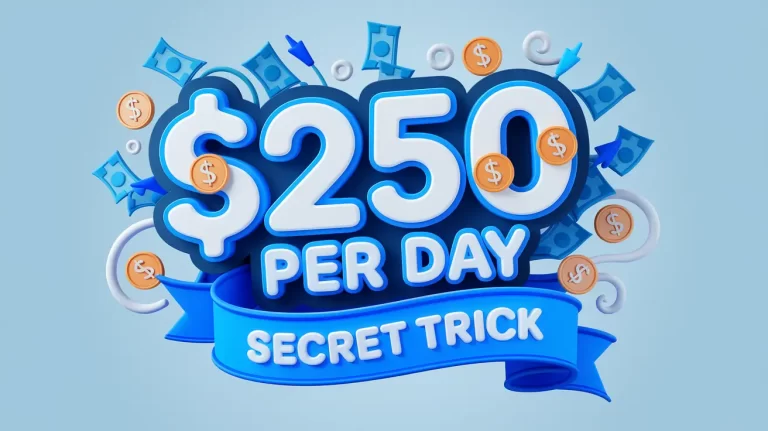

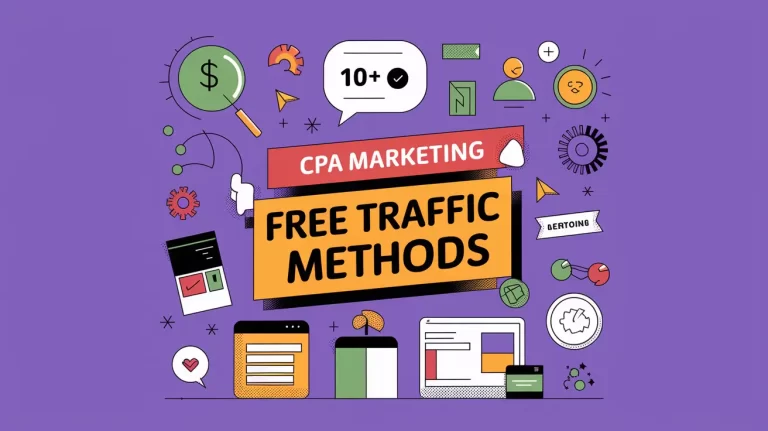
One Comment
hello dear, this gives me very helpful information on this article, thanks…